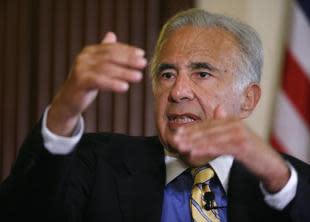In the Battle Between Transocean and Icahn, How Will Investors Win?
By Marek Fuchs
As Transocean (RIG) heads into what promises to be a contentious shareholder meeting on Friday, media outlets are focusing attention on who will win a battle.

In one corner, they place Carl Icahn, the shareholder activist with a knack for gathering notice and dollars – at least for himself. In the other corner is Transocean’s bumbling old guard. The fight: Icahn, who has a 5.6% stake in the company, wants it to shell out a $4/share dividend and replace three of its board members. Transocean counters with a $2.24/share dividend and supports the board as it now stands.
Who will win? Who will lose? The media are often on a wartime footing, emerging with one side framed as the conqueror and the other completely vanquished. Stories, after all, are easier to tell when seen through the lens of absolute victory or loss. But the answer might not be so simple.
What we know
We’ll get to the why soon enough – but here’s what we know so far:
Icahn has already been declared the winner of the first round, as Michael Talbert, Transocean’s chairman and former chief executive, preemptively announced his retirement this week. Rounds two and three will include the battles over directors and dividends.
But if Icahn “wins” all three rounds – and any others that emerge – does that mean the Transocean investor can declare victory as well? That’s the assumption of some in the media, who admire Icahn for stirring up so much controversy. (This week Icahn worship hit a bizarre level in Forbes with an article positing that Icahn should get – well, let the headline do the talking: Carl Icahn Deserves The Nobel Prize.) Traders who follow such media hyperbole helped push the stock up when Icahn’s level of involvement with Transocean became apparent earlier in the year.
But here’s the rub: Although Icahn is revered in media and shareholder activism circles, his modern-day record – see: Oshkosh (OSK), MGM (MGM), Motorola (MSI), Dynegy (DYN) and more – is mixed at best. Remember, this is the man who in 1985 took control of Trans World Airline and famously donned a pilot’s jacket while dancing around his office screaming, ''We've got ourselves an airline! We've got ourselves an airline!'' before running the company into a veritable ditch.
In the short term
Yes, the adoption of a $4 dividend will be framed by the media as the ultimate Icahn win. In his typically self-serving way, Icahn, who said he doesn’t want management to “waste” its cash, is looking to goose the stock, and it just might work – at least, over the short haul.
But investors are more likely to win over the long term if the two sides engage in a messy compromise. A dividend on the order of $3 will put cash in the pockets of shareholders but leave enough to invest in Transocean’s drilling business. Long-term, Transocean won’t emerge from its troubles (including the catastrophic 2010 BP oil spill that followed the explosion of its Deepwater Horizon rig) with cash giveaways to shareholders alone. The company needs to really invest in its deep-water drilling operations.
In announcing his retirement, Talbert was in part attempting to thwart Icahn’s plan to stack the board with three directors. So who will win there?
Can you guess?
Investors are more likely to win if there is – again – a messy compromise that dissatisfies both Icahn and management, with Icahn emerging with a seat or two. From cost cutting to acquisitions, Transocean’s management has been uninspiring at best. They need to be poked and prodded. But Icahn has hardly proven himself a great long-term steward of anything other than his own outsized ambitions, so he shouldn't get his entire wish here.
The media will focus on declaring an absolute winner. But in the battle of Icahn and Transocean, investors are most likely to win if no one else does.
Marek Fuchs was a stockbroker for Shearson Lehman Brothers before becoming a journalist who wrote The New York Times' County Lines column for six years. Fuchs speaks regularly on business and journalism issues at venues ranging from annual meetings of the Society of American Business Editors and Writers to PBS to National Public Radio. His recent book, "Local Heroes: Portraits of American Volunteer Firefighters," earned widespread praise. He is on the writing faculty at Sarah Lawrence College. When Fuchs is not writing or teaching, he serves as a volunteer firefighter. You can contact him on Twitter: @MarekFuchs.
